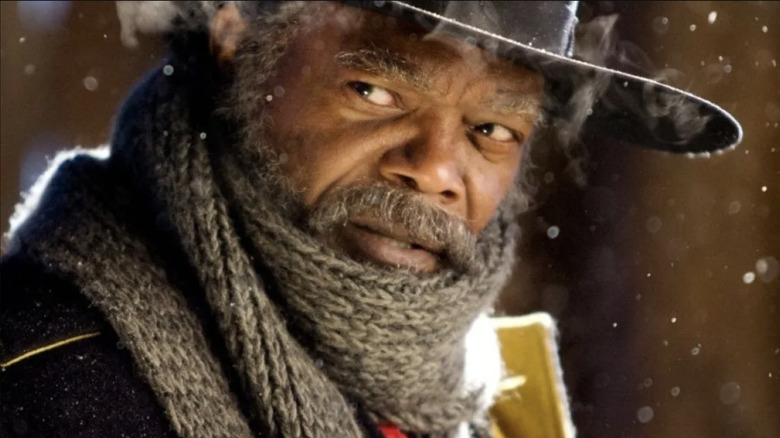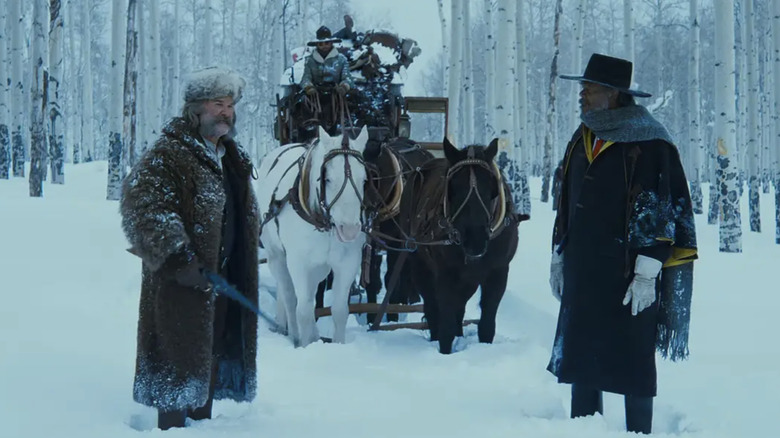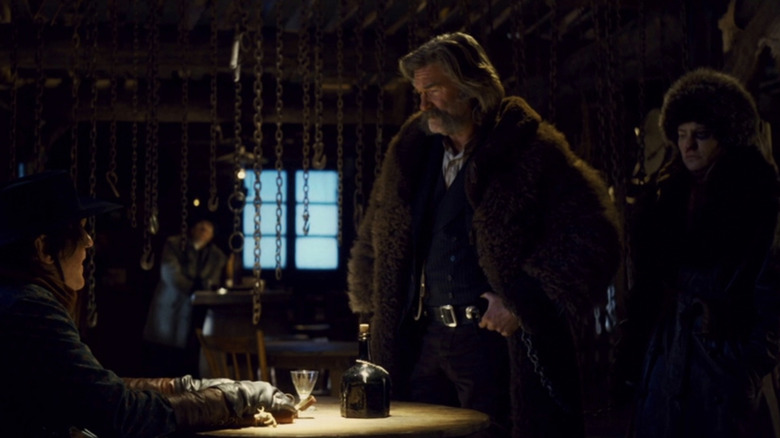Quentin Tarantino Didn't Realize What A 'Serious' Film The Hateful Eight Would Be
Many, if not all, of Quentin Tarantino's films, feature some form of intense violence or action. At this point in the director's career, it's expected that some form of confrontation ends in a fight one way or another. Most of these fights are over-the-top blood fests that play into Tarantino's love of older action films. Other times, such as the torture scene in "Reservoir Dogs," it's used exploitatively, further exemplifying the story's intense nature. However, one rare film in the director's catalog used its violence more dark and unexpected. 2015's "The Hateful Eight," Tarantino's eighth film, is a single-location mystery Western that uses its period setting to tell an incredibly harrowing and dark story.
Moreover, "The Hateful Eight" painfully mirrors modern-day societal tensions in a way that ended up being unexpected even to the director. Tarantino had created the film to be intentionally ugly and hateful (as the title so obviously suggests). However, how Tarantino wrote the characters and his desire to play with the mystery genre would lead the director down an unexpected path that would transform the Western into a much more serious film than he ever expected. Thankfully, this seriousness is all the better for "The Hateful Eight," reinforcing Tarantino as a director who is more than ready to use his talent for violence and dialogue to create something more potent and intense than his previous work.
'I'd be kicking a can that deals with these issues'
In a 2015 interview with Entertainment Weekly, Quentin Tarantino was asked about the provocative nature of the script for "The Hateful Eight" and specifically how it deals with racial tensions. Tarantino knew that he would be dealing with that to some degree but wasn't sure just how extreme it would get:
"It's sprinkled in just during the hot-house environment of writing this piece. I felt that by throwing a black cavalry officer in the middle of this mix and knowing that I was going to have a Southern general and, like, the son of Quantrill in this mix, I'd be kicking a can that deals with these issues. How much that can would be kicked and how much would spill out, I didn't know."
Tarantino is a writer that's not rigid in his process, preferring to leave aspects of his stories up to the viewer's interpretation, whether it's the briefcase in "Pulp Fiction" or the fate of Mr. Pink in "Reservoir Dogs." In the case of "The Hateful Eight," Tarantino left the specific period of the film for the audience to decide, but the director nonetheless set it after the Civil War. The timeliness of its characters and the vitriol spat out by some of the more troubling and racist characters in the film would, unfortunately, speak to the political climate at the time of the film's release.
An examination of the Civil War
Tarantino's intentions with the film ended up differing from the final product. Interestingly enough, the mystery genre got the director to write the film in the first place. Still, the story morphed into a movie wholly unique in his filmography and how it deals with serious issues as he tells EW:
"The film that I ended up making ends up being a really serious examination of both the Civil War and the post-Civil War survivors. But I really was coming more from a mystery angle, creating a little Agatha Christie thing. That was what got me putting pen to paper. Obviously, I knew I was going to deal with the Civil War. But I didn't know it would end up being so serious when it came to that issue."
"The Hateful Eight" isn't short on troubled characters that accentuate the bloody shootouts in the movie, turning the bloodbaths into something that feels much more personal. Quentin Tarantino even spoke with /Film in 2019, stating that he believed the film turned out as grim as it did because, in his words, he "thought it was just the nature of the beast." Tarantino always seems more than willing to let a story play out as organically as possible, which speaks to his quality as a filmmaker and a writer.


